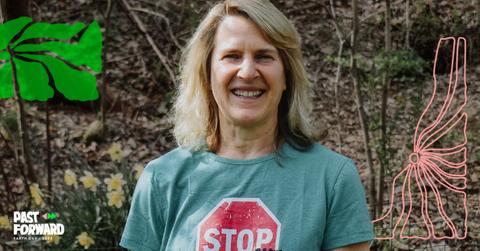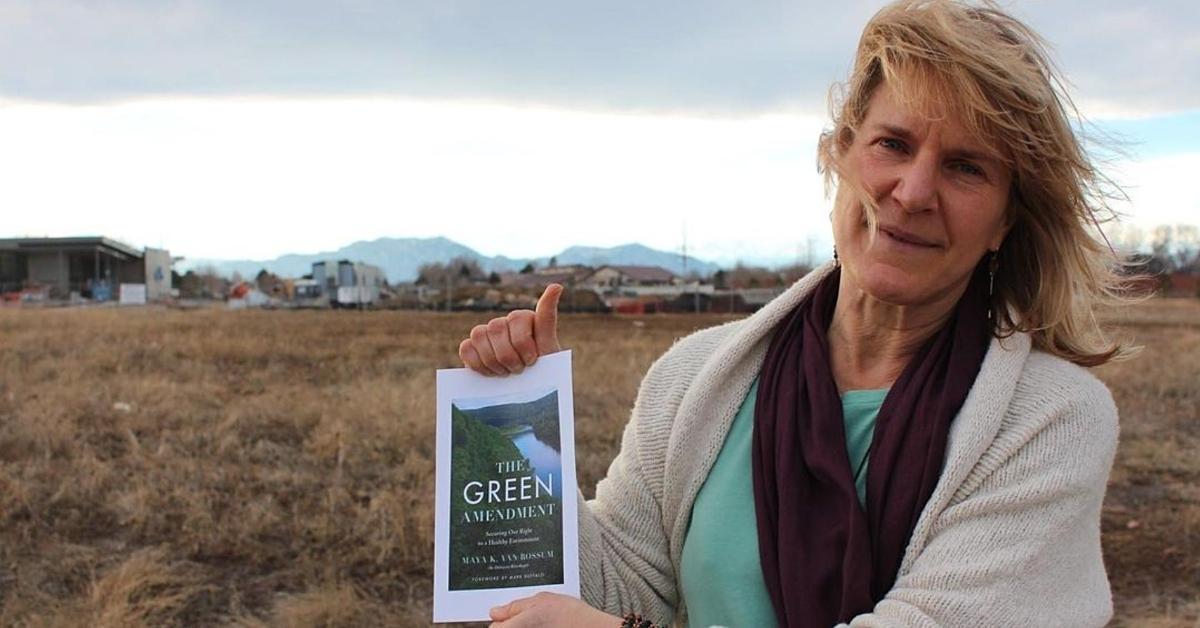Delaware Riverkeeper Maya K. van Rossum Is an Environmental Justice Warrior — Inside Her Fight to Save the Planet (Exclusive)
Published April 22 2023, 11:00 a.m. ET

To boast a moniker as iconic as "the Delaware Riverkeeper," one must devote their life to the cause: Saving planet Earth. For author, environmental attorney, public speaker, and environmental justice warrior Maya K. van Rossum, being Mother Nature's champion comes as naturally as the flow of the Delaware River — which stretches 330 miles, providing drinking water to more than 17 million people and a freshwater habitat to more than 60 fish species. It's no wonder the massive river has been deemed the "lifeblood of the Northeast."
Van Rossum has served as the Delaware Riverkeeper and leader for the Delaware Riverkeeper Network — a regional advocacy organization — for over 30 years, tirelessly working to protect and restore the Delaware River and its tributaries via "advocacy, science, and litigation."
She's also the founder of national nonprofit organization Green Amendments For The Generations, author of the 2017 book The Green Amendment: Securing Our Right to a Healthy Environment as well as its 2022 second edition, The Green Amendment: The People's Fight for a Clean, Safe, and Healthy Environment, and founder of the Environmental Law Clinic at Temple University’s Beasley School of Law.
In an exclusive phone interview with Green Matters in honor of Earth Day, the Northeast's resident river goddess got candid about the challenges that come with the Delaware Riverkeeper gig, the importance of Green Amendments, and being a fierce voice for our voiceless environment.
In a world plagued by unceasing environmental disasters, throwaway culture, and a climate crisis, Maya K. van Rossum is a beacon of hope.
This interview has been edited and condensed for length and clarity.
GREEN MATTERS: Can you tell us about how your journey into environmental activism began?
MAYA K. VAN ROSSUM: I was born an activist and an earth lover. And I was encouraged to spend time in nature. I had a mother who was always a champion for doing what what was right.
When people were throwing leaves out as trash, my mother would drive around the neighborhood and pick up those big black plastic bags full of trash, take them home, compost the leaves, and reuse those trash bags.
When I saw injustice or inequity, when I saw somebody being bullied or who needed somebody to stand with them or be their champion, it was my natural inclination to help and care for others.
And in our world, probably the biggest voiceless victim is the environment. Of course, there are many human communities that are devastated, damaged, and need help. But our environment is among them. And our environment doesn't have a voice in our human world unless somebody's willing to rise up and champion her.
GM: The Delaware Riverkeeper Network challenged and defeated Pennsylvania’s pro-drilling Act 13, helped keep fracking out of the watershed, and so much more. What are some of the current daily challenges concerning the Delaware River that you are working to remedy?
MKVR: One of the biggest battles, of course, is taking on the fossil fuel industry.
And very recently, the watershed has been opened up to the threat of the importation of toxic frack wastewater for treatment, storage and disposal, and that opens up a myriad of potential pathways for harm.
The Delaware River is home to a genetically unique population of Atlantic sturgeon, which is only found in the Delaware River. At this point, we have less than 250 spawning adults left.
We have regulatory agencies like the Delaware River Basin Commission, which is failing to put in place standards to ensure that there is enough oxygen in critical reaches of the river that the sturgeon need. We have liquefied natural gas export facilities being proposed for the banks of the Delaware River.
We have new port operations that are being proposed all the time, there are ongoing dredging and deepening projects by the U.S. Army Corps of Engineers.
GM: As “the Mother of the Green Amendment," you’re dedicated to inspiring the passage of Green Amendments in every state constitution across the U.S. What are Green Amendments, and how do how they address both environmentalism and antiracism?
MKVR: Green Amendments are amendments that are placed in the Bill of Rights section of our state and federal constitutions and recognize the rights of all people to clean water, clean air, a stable climate, and healthy environments. They literally lift up environmental rights.
They are given the same highest constitutional standing recognition and protection as the other fundamental rights we all hold dear.
The way our system of laws works right now, it literally is focused on legalizing environmental pollution, degradation, and harm. It is not illegal to spew pollution into the air, into the water, to fill in wetlands, to devastate a species or an ecosystem, to destabilize the climate with bad decisions regarding the perpetuation and growth of fossil fuels.
As long as you get the right reviews and the right permits from the right agencies, it's all very legal. And that's part of the problem.
The reality is, under this system of laws, communities of color, Indigenous communities, low-income communities, and immigrant communities are harmed even worse than everybody else. It is the environmental version of systemic racism.
But when you have a constitutional Green Amendment, when everybody has the same constitutional rights to a clean, safe, and healthy environment, environmental racism is constitutionally prohibited.
GM: How do we hold corporations accountable for damage; for example, for the Ohio train derailment?
MKVR: When there are these kinds of serious ramifications, we need to be making sure our government officials are taking the powerful action they need to protect the environmental rights of the people.
We need to be making sure through that Green Amendment lens, but also through the legislative lens, that our government officials are truly holding corporations accountable.
At the same time, we have to recognize that when it comes to the environment, human health, people's lives, once the damage is done, you actually cannot undo it. And that's why prevention is so essential. That is why we cannot have a system of laws that is focused on legalizing pollution so corporations can make more profits.
GM: How can every person make a difference to protect their local environment?
MKVR: First, identify what their own personal priority is, what interests them in terms of the environment, and then pursue that.
We are not going to save the world by everybody simply using reusable water bottles, we have to change the nature of governance and decision making and hold industrial operators accountable to protect our environment and protect our community. So I really encourage people to pick one thing to get active around. Signing petitions, writing letters, going to municipal meetings, finding what that nonprofit is doing — just get involved and stay involved.
But there is a lot of importance in living what you believe. So you really should use that reusable water bottle and that reusable coffee cup. You should not have massive lawns.
Examine your own life and think about all the things you can do to make a difference, and then make that change. Be the change that you want to see, right? Environmental harm is so often about cumulative impacts, the accumulation of harm over time and space. The same happens in terms of good stuff.
This article is part of Green Matters’ 2023 Earth Day programming, Past Forward: A series of stories about keeping the spirit of the first Earth Day alive. We hope these stories inspire you to get active in the fight for climate justice.
